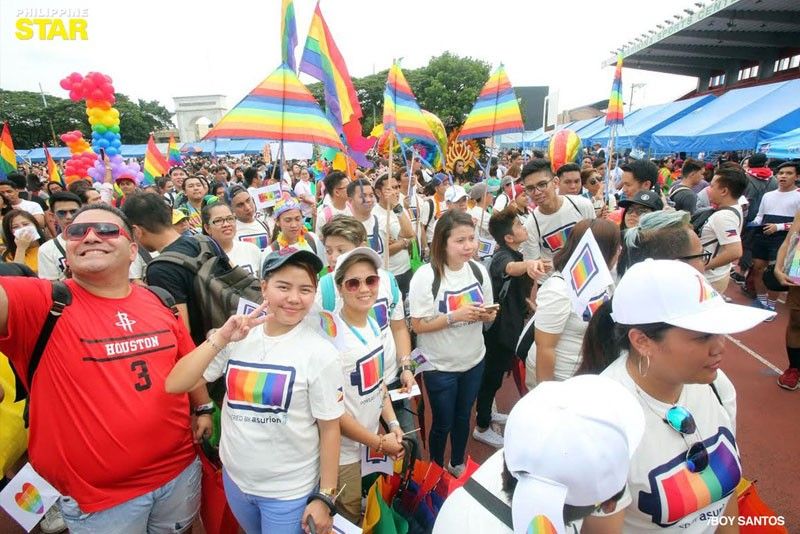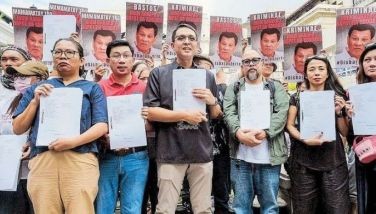SOGIE bill will not outlaw Bible-based beliefs on LGBTs

MANILA, Philippines — Christians like Rep. Eddie Villanueva (CIBAC party-list) and other religious will not be penalized for their beliefs, including that LGBTQ+ people are living sinful lives, if the SOGIE Equality Bill becomes a law since it respects religious freedom, the author of one version of the bill said.
In a privilege speech at the House of Representatives in late August, Villanueva—leader of the Jesus is Lord movement—lamented that passage of the bill would silence him and others who believe that homosexuality is a sin.
"What happens to a Christian like me and to the majority of people in this August chamber if we are to be threatened with punishment every time we share our Bible-based beliefs on matters of transgenders and homosexuals?" he said.
In an email to Philstar.com, Sen. Risa Hontiveros said the SOGIE Equality Bill she filed at the Senate does not infringe on religious doctrines, teachings and rights.
Under the SOGIE Equality Bill, "[promoting and encouraging] stigma on the basis of SOGIE in the media, in educational textbooks, and other medium" is considered a discriminatory practice and penalized.
"Inciting violence and sexual abuse against any person or group on the basis of SOGIE is likewise prohibited," the bill reads.
Hontiveros said "the bill respects religious freedom as a basic human right", adding the bill was filed to end discrimination against and abuse of people based on their SOGIE—their sexual orientation, gender identity or expression.
"It starts with accepting the fact that LGBTQ+ persons should enjoy the same rights as everyone – including the right to live peacefully, and to not be treated as a lesser person," she said.
RELATED: 'Call them sir or ma'am,' Risa says amid senators' SOGIE 'confusion'
Not 'same-sex marriage in diguise'
At a press conference at the House of Representatives in August, Rep. Geraldine Roman (Bataan), the first transgender woman elected to Congress, stressed SOGIE equality does not mean people have to let go of their religious beliefs.
"Nothing will stop you from believing that we LGBT are abominations in the eyes of the Lord or are children of the devil," she said.
"Nothing will stop you from that, you will not be penalized for believing what you believe in, but please do not step on our right to work, to study, to receive services from the government, to access commercial and public establishments... to not be insulted on the streets."
"The SOGIE Equality Bill is not same-sex marriage, it is not an infringement on your religious liberties," she said.
The SOGIE Equality Bill does not amend the Family Code of the Philippines, which states that "marriage is a special contract of permanent union between a man and a woman entered into in accordance with law for the establishment of conjugal and family life."
Hontiveros, in an email, said "[claims] that the bill will compel churches and priests to perform same-sex marriage is fake news."
RELATED: It’s up to Congress to act on SOGIE bill – Palace
SOGIE bill recognizes schools' rights
Villanueva and other critics of the bill have said that schools could be shut down for turning away, for example, a transgender male applying for admission to an all-boys' school or for expelling "a trans woman who insists on cross dressing despite getting a ton of warnings."
But Hontiveros said that the bill "recognizes the right of certain sectarian, religious schools to operate based on their faith and in line with the best interest of children."
The SOGIE bill penalizes refusing admission or expelling a person on the basis of their SOGIE, but also adds that "the right of educational and training institutions to determine the academic qualifications of their students or trainees shall be duly upheld."
The bill also penalizes a school or training institution for imposing harsher sanctions and penalties on students on the basis of their SOGIE and even on the basis of their parents' or legal guardian's SOGIE.
Inclusion and protection in schools
Hontiveros said that the bill will mandate public basic and higher education institutions to implement policies for diversity and inclusion "that reaches out to LGBTQ+ youth who are more prone to suffer severe mental health issues compared to cisgender-heterosexual (“straight”) children."
She said LGBTQ+ youth are more vulnerable to mental health issues because of non-acceptance and bullying the students may face in schools from fellow students as well as from school officials.
"Sadly, this has led to many cases of self-harm, even suicide," she said.
In a 2017 report, Human Rights Watch pointed out that many LGBTQ+ students face bullying and discrimination and that most schools are not equipped to give them the support they need.
"When I was in high school, they’d push me, punch me," Carlos M., a respondent in the HRW report said. He also said abuse and bullying happened even outside the school grounds.
This, despite a law against bullying and Department of Education guidelines prohibiting bullying on on the basis of sexual orientation and gender identity, HRW said.
Many of the respondents said then that they were not aware of policies against bullying or did not know who to turn to in case they were bullied or harassed.
"Unfortunately, positive information and resources regarding sexual orientation and gender identity are exceedingly rare in secondary schools in the Philippines. When students do learn about LGBT people and issues in schools, the messages are typically negative, rejecting same-sex relationships and transgender identities as immoral or unnatural," HRW said in 2017.
'Equality is not special treatment'
Critics of the bill have also claimed that it privileges LGBTQ+ over all other Filipinos.
"To enact another law that upholds one sector's perceived rights over the rights of other people who do not belong to that sector is simply unfair, isn't it? In fact, equally discriminatory, it will be a law of preferential rights, a class legislation," Rep. Villanueva said in his privilege speech.
Hontiveros said, though, that what the bill espouses is equal treatment.
"Numerous cases of discrimination against LGBTQ+ persons point to a lack of legal support for these cases," she said.
"Employers can choose to discriminate against LGBTQ+ persons on the basis of their SOGIE, trans people can be refused service in establishments, and gay men can be denied access to health services because of stigma. These are no laws protecting the LGBTQ+ persons based on their SOGIE," she also said.
Roman, at the press conference in August, said that the access to services and protection from discrimination and harassment that the SOGIE Equality Bill espouses "are not extra rights, these are not priviliges."
These are the same rights enjoyed theoretically by many Filipinos," she also said.
- Latest
- Trending































